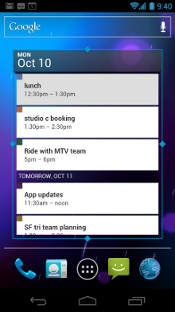Google reveals development hiccups in transitioning to ‘Ice Cream Sandwich’
Oct 21, 2011 — by LinuxDevices Staff — from the LinuxDevices Archive — 1 viewsGoogle announced that ongoing changes to some undocumented aspects of the Android 4.0 (“Ice Cream Sandwich”) build — related to calendar and text-to-speech functions — could cause some problems for developers. Meanwhile, several smartphone vendors have promised support for Android 4.0, while analysts explore the release in greater detail.
Shortly after announcing Android 4.0 ("Ice Cream Sandwich") on Oct. 19, Google announced it would release source code for the new operating system "soon" to join its already released software development kit (SDK). However, on Oct. 20, the company cautioned that it is making changes to the build in still undocumented areas — such as the calendar and text-to-speech functionality — that will affect some Android developers.
 With Ice Cream Sandwich (ICS), the Android Framework will include a complete set of APIs for accessing Google Calendar data, shown at right as a resizable widget. These complete, documented APIs are part of Google's Android Application Framework. This means their tests appear in the compatibility test suite (CTS) so Android OEM partners can prove that the APIs work.
With Ice Cream Sandwich (ICS), the Android Framework will include a complete set of APIs for accessing Google Calendar data, shown at right as a resizable widget. These complete, documented APIs are part of Google's Android Application Framework. This means their tests appear in the compatibility test suite (CTS) so Android OEM partners can prove that the APIs work.
However, the complete Calendar APIs may prove to be a hiccup for developers who have built applications with undocumented Calendar APIs that haven't been subject to the rigors of the Android test process, says Google.
"Unfortunately, these integrations were unsupported, and prone to breakage by platform updates or OEM customization of calendar features," explained Android developer advocate Tim Bray in a corporate blog post.
"We want to see lots of good calendar apps and extensions that work reliably across Android devices, and aren't broken by platform updates," continued Bray. "So we decided to create a clean API, including a comprehensive set of Intents, to manage calendar data in ICS."
What this means is that anyone can code against these new APIs with the knowledge that not only will Android support them, but that partners have to support these APIs as well. When the new APIs are finished, developers will have to update their programs for them to run correctly on ICS's compatibility test suite.
Android 4.0 also features a complete, text-to-speech API running on Dalvik that developers can access using ordinary Java code. This means the old C++ API Google provided will no longer be supported. However, Bray promised Google will have a compatibility layer that developers can use as a bridge between the old API and the new one.
Stated Bray: "We recognize that this means some work for developers affected by these changes, but we're confident that Android programs in general, and both Calendar and TTS apps in particular, will come out ahead."
Google did not release its "Honeycomb" build to open source, stirring up considerable controversy. However, the company has promised to get the code into developers' hands this time around.
These plans were confirmed on Oct. 19 when Google software engineer Dan Morrill wrote in a blog post, "We plan to release the source for the recently-announced Ice Cream Sandwich soon, once it's available on devices."
Droid Bionic and Sony Ericsson Xperia will get ICS
 Samsung's Galaxy Nexus smartphone (pictured) will be the first to receive Android 4.0 when it ships in November, and it will likely have an exclusive for the first several months. Hackers are already prepping a ROM port to the Nexus S 4G, however, and the same day as the Galaxy Nexus announcement, Motorola said it planned to update its Motorola Razr to ICS in "early 2012."
Samsung's Galaxy Nexus smartphone (pictured) will be the first to receive Android 4.0 when it ships in November, and it will likely have an exclusive for the first several months. Hackers are already prepping a ROM port to the Nexus S 4G, however, and the same day as the Galaxy Nexus announcement, Motorola said it planned to update its Motorola Razr to ICS in "early 2012."
Since then, Motorola has added its Droid Bionic to the list of future Android 4.0 upgrades, according to a Facebook post by Motorola's Sam Backus. No timing was detailed, however.
 Sony Ericsson also turned to Facebook to announce upcoming ICS support, as reported by Dutch blog AllAboutPhones. All Xperia smartphones launched in 2011, currently available with Android 2.3.4, will be updated to Android 4.0 in 2012, says the story. This is said to include phones such as the Xperia Play (pictured at left), Neo, Neo V, Mini Pro, Ray, Pro Active, Arc, and Arc S.
Sony Ericsson also turned to Facebook to announce upcoming ICS support, as reported by Dutch blog AllAboutPhones. All Xperia smartphones launched in 2011, currently available with Android 2.3.4, will be updated to Android 4.0 in 2012, says the story. This is said to include phones such as the Xperia Play (pictured at left), Neo, Neo V, Mini Pro, Ray, Pro Active, Arc, and Arc S.
As far as we know, no ICS updates for tablets have been announced so far. However, one likely candidate is a new Asus Transformer Prime tablet revealed earlier this week by Asus Chairman Jonney Shih that will be based on Nvidia's quad-core Tegra 3 ("Kal El") system on chip. ZTE has also preannounced a T98 tablet based on the Tegra 3, which is also likely to receive the ICS upgrade.
HTC, meanwhile, was more guarded in its Android 4.0 promises. As reported by Pocket-Lint, HTC released a statement saying, in part, "While our goal is to upgrade as many of our recent devices [to ICS] as possible, we are committed to maintaining every phone's performance and usability first. Please stay tuned for more updates on specific device upgrade plans."
Commenting on the report, TechCrunch offered its own wry translation of HTC-speak thusly: "We have no idea how long it's going to take us to lay Sense over Android 4.0, so bear with us."
A long slow upgrade path to ICS?
Slow upgrades may indeed be a problem with ICS, writes Wayne Rash in an Oct. 19 analysis piece in eWEEK. Rash suggests it might be quite awhile before most Android users see ICS.
Rash argues that while Android 4.0 nicely re-integrates the Honeycomb tablet fork with the mainstream Android 2.x smartphone platform, it does not solve one of the platform's chief faults: slow upgrades. The profusion of devices, manufacturers, and UI skins such as HTC Sense will continue to frustrate users waiting for the latest features, he adds.
Still, most observers appear to be impressed with the release. Ars Technica's Ryan Paul, for example, took a look inside the new Android 4.0 SDK, and praised various goodies, such as the new face recognition and camera code. The sluggish emulator that ships with the SDK, however, "still leaves a lot to be desired," writes Paul.
Echoing a recently released quote from the late Steve Jobs from an upcoming biography, in which Jobs was said to have called Android a "grand theft" of iPhone technology, Eric Zeman says many of Android 4.0's innovations were borrowed from other platforms.
In "Android 4.0 Ice Cream Sandwich: Brilliant Thievery?", Zeman praises a number of ICS features, but argues that the new ability to drag and drop apps and shortcuts into folders. for example, is an Apple iOS trick. Meanwhile, the ability to swipe away unwanted notifications comes from WebOS, and the latest Facebook integrations are stolen from Windows Phone, adds Zeman.
The Samsung Galaxy Nexus that will showcase Android 4.0 in November has been faulted for offering only a five-megapixel camera and providing Super AMOLED instead of the superior Super AMOLED Plus. However, according to Don Reisinger writing in eWEEK, the phone is likely to be a winner. Reisinger writes that features like the large display, LTE, and NFC, as well as ICS itself, appear to make the Nexus a "fine option for just about any consumer looking for a new smartphone."
Finally, eWEEK has posted a slide show of Android 4.0, with further notes on features.
Clint Boulton is a writer for eWEEK. Eric Brown also contributed to this report.
This article was originally published on LinuxDevices.com and has been donated to the open source community by QuinStreet Inc. Please visit LinuxToday.com for up-to-date news and articles about Linux and open source.